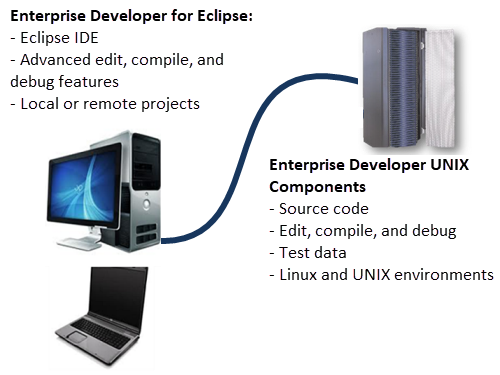New to Micro Focus Enterprise Developer UNIX Components
Enterprise Developer comes with a license for Micro Focus Enterprise Developer UNIX Components (UNIX Components).
The following sections explain what UNIX Components is, the different ways in which you could use it, and considerations you need to be aware of when using it.
What is Micro Focus Enterprise Developer UNIX Components?
Micro Focus Enterprise Developer UNIX Components is part of the Enterprise Developer product portfolio from Micro Focus. It does not include an IDE, is entirely command-line based, and includes testing and developer productivity tools on UNIX. (References to UNIX can be taken to include Linux unless otherwise stated.)
Development scenarios
You can use Micro Focus Enterprise Developer UNIX Components in one of the following ways:
- As a stand-alone UNIX application development environment. You compile, debug, and run applications from the command line.
- As a companion to
Enterprise Developer for Eclipse in remote development scenarios.
You use Enterprise Developer for Eclipse to create and maintain projects on the remote UNIX machine that has the sources and UNIX Components installed. See the product help of Enterprise Developer for Eclipse for more information.
Using UNIX Components as a stand-alone development environment
If you use UNIX Components as your main development environment, you keep the project source code, databases and other services on the target UNIX or Linux platform and use the command line to edit, compile and debug the code directly on the target machine.
Micro Focus Enterprise Developer UNIX Components provides the COBOL, IMS and PL/I compilers, the Animator and a variety of command line tools to help you maintain your existing application directly on target UNIX or Linux platform.
See Considerations below for information on what is supported.
Using UNIX Components with Enterprise Developer for Eclipse
You can use UNIX Components in conjunction with Enterprise Developer for Eclipse.
You maintain the sources using an Eclipse project (either local or a remote one) and can take full advantage of the development and testing features of the IDE. The project's source code, databases and other services are stored on the target UNIX or Linux platform while the Eclipse environment runs on the programmer's desktop for maximum performance:

Source code is stored either on the target UNIX or Linux machine or within the source control system being used in Eclipse and checked out to the programmer's work area on the server. This source code is accessed from the Eclipse client via a variety of standard network methods. There is no need to copy source code to the programmer's local desktop and then copy it back to the server for system or integration build and test.
UNIX Components includes a debug engine which the Eclipse client accesses to debug COBOL and PL/I applications. (You need to have an X window implementation installed and running before you start to debug remote PL/I applications.)
The code on the server can access local databases, middleware or other services without complex simulation or duplication of the services on the programmer's desktop. A lightweight and easy to manage protocol is used for debugging, particularly where access to the application's server is protected by a firewall.
UNIX Components performs the application builds on the server with all messages (for example, warnings, errors and success messages) being returned to the Eclipse client.
Considerations when using UNIX Components as a stand-alone environment
Projects:
Projects are only available in conjunction with Enterprise Developer for Eclipse. You create and maintain the project in Enterprise Developer for Eclipse on your local workstation, and develop the application remotely with the sources stored on a UNIX box.
COBOL code:
Compiling, linking, debugging and running is supported from the command line. See Related Information.
CICS code:
CICS BMS compilation is supported from the command line using the MFBMSCL utility. See BMS Compiler.
IMS code:
Compiling IMS programs (.dbd, .psb, and .mfs) is supported on both Windows and UNIX and the generated binaries are cross-platform compatible.
Compiling on UNIX produces shared objects. If your sources are compiled on Windows, only the .int files are portable to UNIX.
PL/I code:
Compiling, linking, debugging and running PL/I applications is supported from the command line.
Assembler code:
Assembler is not supported on UNIX. It is only supported on 32-bit Windows in offload scenarios in development (using Enterprise Developer) and in testing (using Enterprise Test Server), and is not supported in production.
If you have an existing application that uses Assembler and need to migrate it to UNIX, you need to rewrite any Assembler code as Micro Focus COBOL code.